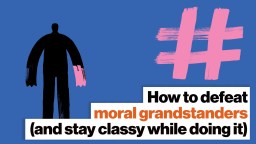BRANDON WARMKE: If you had a bumper sticker and you wanted a quick, dirty definition of moral grandstanding, it's the use of moral talk for self-promotion. Grandstanders are moral showboaters. They use public discourse as a vanity project. They're less concerned about saying what's true. They might be less concerned about helping other people. They're less concerned about contributing to a conversation that might be productive.
More specifically, someone might want to be seen as having spectacular, superhuman insight into what is just. Some people might want to be seen as caring the most about the poor or about the troops. Some people might want to be seen as the most affected by some injustice. So grandstanding doesn't always look like the same sort of animal. Grandstanding sometimes looks like piling on. You often see cases of piling on when a lot of people join in on a shame fest for someone who's misspoken or engaged in a small minor infraction. In order to signal to their in-group or to their enemies that they have a heightened sense of justice, they pile on in cases of public blaming and shaming.
Another form that grandstanding takes is what we can call ramping up. Ramping up involves trying to out-do each other in moral discourse. You can think of it as a kind of moral arms race. So I might say something like, 'The senator's behavior was highly unacceptable. She should clearly be censured for it.' Now you, not wanting to be outdone, might say something like, 'Yes, I agree that her behavior was wrong, but it's clearly way out of bounds. She should no longer hold her office. She should be impeached.' And then someone else, again, not wanting to be outdone, might say, 'As someone who has long stood on the side of injustice, we should look into the criminal law. This cannot go unpunished. We must remember the world is watching.' And you can think of ramping up in terms of what psychologists call social comparison. Social comparison theory says, roughly, we think of ourselves in comparison to others. So if I think of myself as caring deeply about the poor or about the troops, that's going to be important to me, I'm going to think of myself as a more just person or a more caring person than my peers. What happens in conversation is that once people reveal their positions about how much they care about or how affected they are by some problem, you can now look like you don't care as much as others about some problem. And so in order to beat someone else in the moral race, you have to outdo them. And so this often results in people taking more extreme stands than they might otherwise do on reflection, because when the world is watching, you must show that you care more.
Moral philosophers tend to think there's three main ways for something to be morally good or bad: One, it could have morally good or bad consequences. Two, it could be morally good or bad insofar as it mistreats other people, or shows them respect or disrespect. And that's irrespective of the bad or good consequences it might have. And third, philosophers will often say something like: Something is good or bad if a virtuous person would do it or not do it. So we think about the virtues, like honesty, courage. We think that grandstanding is bad according to all three ways of thinking that something could be morally good or bad. Grandstanding has bad consequences. We argue that it contributes to political polarization. It increases levels of cynicism about moral talk and its value in public life. And it causes the kind of outrage exhaustion. Imagine if you get outraged about everything in order to show how good you are. Outrage is no longer a reliable signal of serious injustice in the world. And it's going to be harder for you to muster outrage when it actually is called for if we're outraged about everything in order to show our moral qualities. So for those reasons, grandstanding is probably going to have unbalanced negative consequences.
Grandstanding is also disrespectful. So one way to think about this is, you know, I don't know if you've ever lived in a neighborhood where they come around and ask for collections for mosquito treatments. The mosquito treatments are going to happen no matter what. And they ask for you to contribute, but you could get all the benefits of the mosquito treatment without chipping in -- it's called free-riding. Grandstanders are a kind of free-rider, so they get the benefits of having public discourse and moral talk go well when other people don't grandstand, but grandstanders are free-riding because they're getting extra benefits that they don't allow others to have. So think about a world in which everyone was all the time just grandstanding in public discourse. That would not be a world you'd want to live in. So grandstanders, as it were, defect from the norm. They defect from the rules that other people are following in order to get extra benefits for themselves. That's a way of treating other people with disrespect. It's a way of not doing your fair share. It's a way of not playing fair.
We also think that grandstanding tends to reveal bad character. We think that most people who engage in public discourse should do so because they either want to help other people or because they want to help people do what's right and see what's true. Grandstanders, however, are in it for themselves. They're egoistic. So imagine a group of acquaintances who are on the one hand discussing a world historic injustice and on the other fighting or arguing about who's most offended by it. In our view, this is just not how a virtuous person would engage in public discourse. So, look, on balance, we think grandstanding is probably morally bad. It probably has more to recommend against it than in favor of it.






